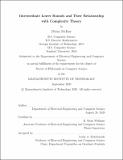Intermediate lower bounds and their relationship with complexity theory
Author(s)
McKay, Dylan(Dylan Mathis)
Download1227704425-MIT.pdf (1.009Mb)
Other Contributors
Massachusetts Institute of Technology. Department of Electrical Engineering and Computer Science.
Advisor
R. Ryan Williams.
Terms of use
Metadata
Show full item recordAbstract
While Complexity Theory has been centered around several major open problems about the relationships between complexity classes, showing resource lower bounds which amount to much weaker versions of these separations still seems to be challenging. We examine some of these lower bounds and techniques for showing them. We improve the techniques of Beame (1989) and use these results to show time-space lower bounds for various circuit problems such as #SAT and a version of SAT for which we are required to give witnesses to satisfiable formulas. We reveal a surprising significance of lower bounds of this kind by presenting their relationships with long-standing questions in Complexity Theory, notably by showing that certain weak lower bounds against the Minimum Circuit Size Problem (MCSP) and other compression problems would imply strong complexity class separations such as P [not equal sing] NP or NP [not subset symbol] P/poly. We further explore techniques for proving lower bounds as well as the connections between lower bounds and the big picture of Complexity Theory. In doing so, we explore the technique of proving fixed polynomial circuit size lower bounds through improvements to the Karp-Lipton theorem and give surprising evidence that improvements to the Karp-Lipton Theorem are (in some sense) the "only" way to prove fixed polynomial size circuit lower bounds against P[superscript NP].
Description
Thesis: Ph. D., Massachusetts Institute of Technology, Department of Electrical Engineering and Computer Science, September, 2020 Cataloged from student-submitted PDF of thesis. Includes bibliographical references (pages 127-133).
Date issued
2020Department
Massachusetts Institute of Technology. Department of Electrical Engineering and Computer SciencePublisher
Massachusetts Institute of Technology
Keywords
Electrical Engineering and Computer Science.